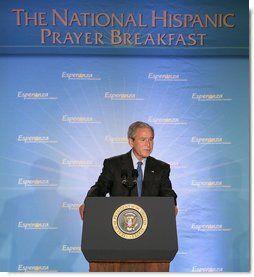According to President Bush's speech at the National Hispanic Prayer Breakfast on June 26, his administration "has provided unprecedented support for the compassionate work performed by faith-based and community groups." He continued this thought by saying that the "government can hand out money, but government cannot put hope in a person's heart." The President remarked that his legacy has been to lower "the barriers that kept government and faith-based groups needlessly divided." The U.S. President also addressed the National Conference of the Office of Faith-Based and Community Initiatives and said that when he came to office his goal was to change the fact that faith-based organizations were "often barred from receiving support from the federal government." His method of change was "compassionate conservatism." The President also recalled that compassionate conservatism was his main agenda item as a candidate back in 1999. In reality, it was his main focus until the foreign policy of the U.S. dramatically shifted after September 11, 2001. Afterall, his first executive order established the Office of Faith-Based and Community Initiatives itself. In essence, this order was meant to ensure that faith-based organizations "do not have to give up their religious character to receive taxpayer money." To be clearer about how his initiative could coincide with true U.S.-style separation of church and state, President Bush said, "Government should never fund the teaching of faith, but it should support the good works of the faithful." The President further spelled out three policies advanced for this cause: 1) The tax code was amended to provide greater incentives for charitable donations; 2) The Compassion Capital Fund was established; and 3) The Pro Bono Challenge was launched this year. The President said that "the movement is bigger than politics or any political party;" 35 governors have faith-based offices , 19 of them Democrats; and last year the government provided "more than 19,000 competitive grants to community and faith-based organizations." The areas where faith-based groups have been active are listed in a White House Fact Sheet, with interesting facts such as: "Of the 60 million people who give their time to others, more than one-third do so through faith-based groups."

(Photo from the White House website)